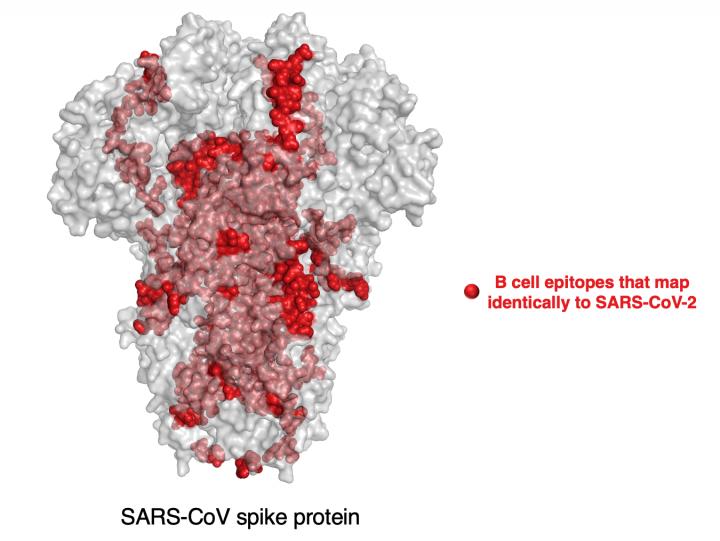
Credit: HKUST
A team of scientists at the Hong Kong University of Science and Technology (HKUST) has recently made an important discovery in identifying a set of potential vaccine targets for the SARS-CoV-2 coronavirus, providing crucial leads for guiding experimental efforts towards the vaccine development against the novel pneumonia (COVID-19) caused by the virus.
Like SARS-CoV, which caused the SARS (Severe Acute Respiratory Syndrome) outbreak in 2003, SARS-CoV-2 belongs to the same Betacoronavirus genus. By considering the genetic similarity between SARS-CoV-2 and SARS-CoV, the team leveraged experimentally-determined immunological data to identify a set of SARS-CoV- derived B cell and T cell epitopes that exactly match to SARS-CoV-2. Epitopes are biomarkers recognized by the immune system to trigger actions against the virus. As no mutation has been observed in the identified epitopes among the available SARS-CoV-2 genetic sequences, immune targeting of these epitopes may potentially offer protection against the novel pneumonia COVID-19.
The team, led by data scientists Prof. Matthew McKay and Dr. Ahmed Abdul Quadeer, expected that their work can assist in guiding experimental research towards the development of effective vaccines against SARS- CoV-2.
Prof. McKay highlighted that “Despite similarities between SARS-CoV and SARS-CoV-2, there is genetic variation between the two, and it is not obvious if epitopes that elicit an immune response against SARS-CoV will likely be effective against SARS-CoV-2. We found that only roughly 20% of the SARS-CoV epitopes map identically to SARS-CoV-2, and believe these are promising candidates.”
“For the identified T cell epitopes, we also performed a population coverage analysis and determined a set of epitopes that is estimated to provide broad coverage globally as well as in China” said Dr. Quadeer. The estimated population coverage represents the percentage of individuals within the selected population that are likely to elicit an immune response to at least one epitope from the identified set.
Prof. McKay is a Professor in the Departments of Electronic & Computer Engineering and Chemical & Biological Engineering; Dr. Quadeer is a post-doctoral fellow in the Department of Electronic & Computer Engineering. Their findings were recently published in the scientific journal Viruses this month.
“Our objective was to try to assist with the initial phase of vaccine development, by providing recommendations of specific epitopes that may potentially be considered for incorporation in vaccine designs” Prof. McKay added. “More generally, our work is part of a global effort seeking to capitalize on data for COVID-19, made available and rapidly shared by the scientific community, to understand this new virus and come up with effective interventions.”
The beginning of 2020 has seen the emergence of SARS-CoV-2 outbreak in mainland China, which has quickly spread to over 30 countries around the world, infecting over 80,000 people and causing over 2,600 deaths as of late February 2020.
###
Media Contact
Johnny Tam
[email protected]
852-235-88556
Related Journal Article
http://dx.




